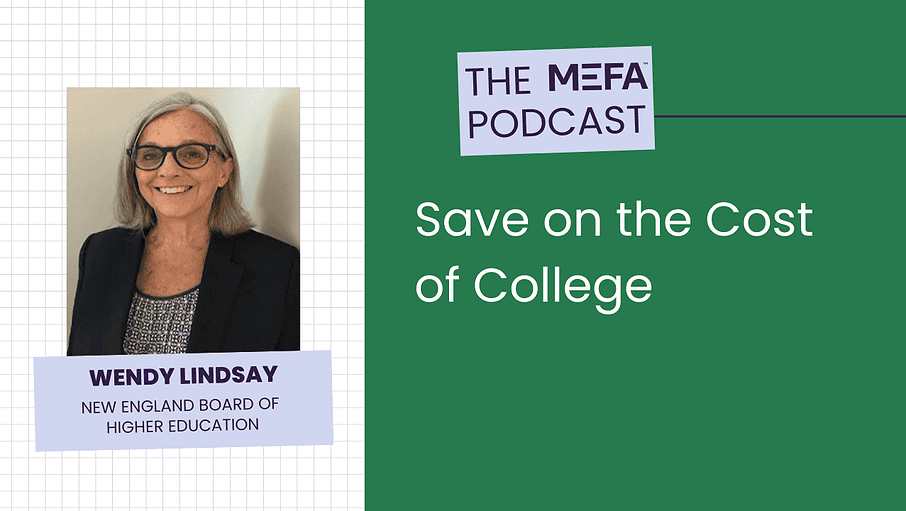

Resources Mentioned in this Episode
Jonathan Hughes: Hi everyone. And welcome to the MEFA podcast. My name is Jonathan Hughes and I’m the Associate Director of College Planning and Education at MEFA. Pleased to be with you. And please, once again, to have with us, we had such a good time last time she decided to join us again. Julie Shields-Rutyna, the Director of College Planning at MEFA.
How are you doing?
Julie Shields-Rutyna: Oh, doing great. Glad to be back, Jonathan.
Jonathan Hughes: Very nice to have you back. Today we’ll hear my interview with Wendy Lindsay from the New England Board of Higher Education. And she’s going to talk to us about some ways that students can save on the cost of college through some of their programs.
So if you have a student who is college bound soon, you might want to stick around for that. We’ll also open up the mailbag and answer some questions that are on the minds of parents and students these days. And always fun to see what they’re asking, but it might be something you’d want to know. But first as always, we have news.
So college and coronavirus still all over the news. So Julie, if you want to have another go and take us through the news this week have at it.
Julie Shields-Rutyna: Well, great. I guess the big news in our world, right? Jon is that October 1st is tomorrow and that’s the day that families can begin to file their financial aid applications.
So the FAFSA, the free application for federal student aid, will open on October 1st. As well, the CSS Profile® form, which is another financial aid application that some colleges use. All colleges require the FAFSA and some also require the CSS Profile. So if for seniors in high school, families should, you know, decide in the next short while or the next few weeks to maybe sit down and complete those forms. We did, I think on the last show, we talked about the fact that FAFSA completion and messages was down from last year, just due to the uncertainty of the coronavirus.
So let’s make sure it’s here and that just really will open up students’ chances from going to college, receiving money, all of that.
Jonathan Hughes: Yeah. And one of the reasons that was at least speculated, I think, that the students didn’t fill out the form other than, you know, the uncertainties from the coronavirus. There was some thought that it was because colleges had to decrease their outreach in terms of FAFSA, help to complete the FAFSA. So we can help with that. Right?
Julie Shields-Rutyna: We definitely can, in fact, MEFA is holding webinars every day. Well, four days a week, for the next six weeks. And so families can go to mefa.org/events and they can find many, many webinars to help them complete the FAFSA and the CSS Profile.
So one that we do is just an overarching College Financing webinar, which teaches them about applying for financial aid and how that’s all gonna work. And then we also have some specific webinars, line by line going through the FAFSA form similarly, one like that with the CSS Profile form.
So those are great resources. And in Massachusetts, we also have another program called FAFSA Day, which is a place where families can get help on the FAFSA. Now it used to be that it happened in person where people could go and bring their materials to sit with an expert who could help them file that form.
But now those events are going to be virtual this year, but people can go to FAFSAday.org and find out when those virtual events are happening. And I believe this year will be more like this, where people could be doing their FAFSA at home and then join the webinar and be able to ask questions, live of experts to help them with the form.
Jonathan Hughes: So that is the big news. And I think the big news of any year, once you roll around to October 1st is that FAFSA and profile are available. Now our next segment of course, is to open the MEFA mailbag. And these are questions that come from families and students over the past few weeks. And remember, if you have any questions to please, please, please call us or email us at [email protected].
So our first question comes to us from Deb and is a very common question. In fact, I’m so excited that you’re here, because you can chime in and let me know if I’m correct in my thinking or what you’re thinking. This is a question that comes up a lot. So, is it true the earlier you complete your FAFSA, the better off you are and increase the possibility of receiving financial aid.
Or also, I’ve heard that some schools tie the FAFSA to awarding merit aid. Is this true? That’s our question. So, number one, is it true that you’re better off if you file the FAFSA right away than it is if you wait a little while. And then secondly, some schools might tie their scholarships, their merit aid, which doesn’t necessarily have anything to do with how you pay for college, to actually filing the FAFSA.
I’m sorry, it doesn’t have to do with your ability to pay for college, but they tie to the FAFSA anyway. So I’ll take that second part first. Some colleges do indeed make filing the FAFSA, a prerequisite for receiving merit aid and merit aid or thing is things like academic scholarships.
So that’s usually one of the reasons that I tell people to file a FAFSA, even if they’re not sure if they should file a FAFSA. A lot of times families think, I don’t think I’m going to get any aid. I just assume I’m not going to get any aid. We make too much money or whatever it might be. Should I still file a FAFSA?
So I tend to counsel people that there’s really no downside to filing a FAFSA. Number one, if the student wants to, if you’re going to be borrowing anything for college. We always say that you should start by taking federal student loans first. And in order to do that, you need to file a FAFSA. So if that’s one way that you’re looking to pay for college, you’re better off beginning by filing a FAFSA.
And then secondly, it may be that colleges want you to file a FAFSA to be eligible for their merit scholarships, which are, again, things like academic scholarships, even though they’re not based on your finances or anything like that. And we know too some state programs, right? You need to file for merit based programs.
I think the John and Abigail Adams scholarship, which is based on your M cast scores from your sophomore year in high school. They still want you to file a FAFSA to be eligible for that. Would you say that’s correct or have anything to add to that too?
Julie Shields-Rutyna: Yeah, no, I think that’s great.
Jonathan Hughes: And now for the first part of the question then, so this is really the controversial part here, not controversial, but a lingering question. I think that’s in a lot of people’s minds. So, is it better to file early then to wait and file? So what would you say?
Julie Shields-Rutyna: Yeah, I would say that I think it’s great to file early, honestly, just to get what can sometimes be a complicated task out of the way.
So that’s my real push for telling people to file early is just. To say, sit down sometime shortly after October 1st. And then you’ll be sure that you’re getting these forms filed by the deadlines for financial aid that the college has set. So colleges set different deadlines. So some colleges might have a November 30th of January 1st, February 1st deadline for financial aid, especially in these early admissions programs, they might even have a November 1st deadline for financial aid. So if the family just gets this done in October, I think it will be sure to meet all of those deadlines.
And the one example I always use is maybe your student is telling you, they’re going to apply to three colleges with deadlines in January, so you don’t get it done. And then they tell you one day as. As teenagers may do. Hey, I made a decision. I’m going to apply to this other college early November 1st, and then you’re scrambling to get these forms done and you don’t want to be in that mindset.
You want to be able to be relaxed, take your time, complete these forms, ask questions, get the help you need. So for that reason, I would say do these forms early, and then sure. If you apply in November versus next April, even if there are deadlines that are being missed, you’re more likely to get financial aid, you know, financial aid in certain circumstances at some institutions could be spent.
I don’t think that happens a lot. I think if you meet the deadline, you’re eligible for everything. But, you know, why not apply early? There really are no downsides to it.
Jonathan Hughes: This question comes to us from Ron and Ron is writing us all the way from Kentucky and he actually attended our understanding the FAFSA webinar.
And he writes, I’d like to know if a student must have already applied to a college in order to have their FASFA information sent to that college. So it was a good question. So easy answer on that is no. For those of you who don’t know when you’re filing your FAFSA, there’s a section where you put in the colleges that you want to send a FAFSA to.
And so colleges, they should usually be colleges that your student is applying to or has already applied to, but sometimes you might not be sure. And you know, the deadlines haven’t passed. And if you’re thinking, when you’re filing a FAFSA, that you might want to send it to a college that you might apply to, you can do that without having sent the admissions application.
They’ll match the two up when, when they get there. So that was an easy answer. Julie, do you have anything to add to that? Nope? Okay. So a third question here comes to us from Amy who writes in to ask, can you tell me if the parents that is not completing the FAFSA form owns the 529 account, does the parent completing the forms include that account on the FAFSA? So as I said, another good question. Julie, do you want to explain how this would work?
Julie Shields-Rutyna: Sure. Yes. Well, I think people can know that 529 plans are considered parent assets on the FAFSA. But in the case of divorce or separation, only one parent then files the FAFSA with the student.
And it’s what is termed the custodial parent. It’s really the parent that the student lived with most over the last 12 months. So that parent then is the one to file the FAFSA with the student. And the other parent does not put any information on the FAFSA form. So if it is the other parent, the non-custodial parents so to speak, that has the 529 plan, then that is not listed on the FAFSA form.
So that’s the easy answer and that’s easy. Should I explain it a little bit more because then financial aid is a little complicated to explain?
Jonathan Hughes: Okay. Why not, we have a few minutes.
Julie Shields-Rutyna: So that is the answer, that doesn’t go on the FAFSA form. However, it’s just good to know that in future years, when the family again applies for financial aid, there is a question on the FAFSA that says, monies received on your behalf. And so if, while the student is in college, at some point that other parent takes money out of the 529 plan and pays college expenses with that. So let’s say the 529 that the parent owns is $10,000, but let’s say they take five out one year and pay some colleges expenses.
Well then when that custodial parent and student are applying for the FAFSA, the next year, they do need to list that there were some money’s paid on behalf and they would list that $5,000 that was paid. And that is true if it’s a non-custodial parent or if it’s a grandparent or an aunt and uncle, anyone who has those savings for the kid, but then for the student, but then pays them.
Jonathan Hughes: So that’s how that works. Right? So now, if people are in the position where someone other than the parent has saved in the 529, they’re the owner and the 529 plan. And it doesn’t get counted as an asset, but they’re afraid that if they use it in a following year, the student is going to be sort of panelized, I guess, for lack of a better word. What can they do?
Julie Shields-Rutyna: Yeah, well, the way financial aid applications work, they’re always looking back at past year’s income. So one thing that many families will do is just have that other person, the non-custodial parent, the grandparent, whatever, wait until the spring of junior year for the student. And then they can use that money and help to pay those expenses because then the way the application goes and looks back, it doesn’t get counted.
So that’s one option. So just be careful about the timing. Another thing is they can just wait altogether. And now with the new flexibility of 529 plans, one qualified expense is up to $10,000 of pay paying off student loans. So that’s another option, that other person could just wait and use the 529 plan to pay up to $10,000 off of student loans for that student.
Jonathan Hughes: Excellent. Yeah, I think that’s good advice. Coming up is my interview with Wendy Lindsay. Okay. Wendy Lindsay is the senior director of regional programming at NEBHE, which is the New England Board for Higher Education. And we’ve known it for quite awhile. Let me find NEBHE is a free resource that MEFA loves to talk about in our programs, stands for the once again, the New England Board of Higher Education.
And they’ve been in existence since 1955. That’s a long time and it was created by the governors of the six New England States. Since then they’ve served to promote college access throughout New England. Wendy Lindsay. Thank you so much for joining us here on the MEFA podcast.
Wendy Lindsay: Yeah, my pleasure. Thank you for having me.
Jonathan Hughes: Sure. I mentioned briefly a little bit about the history of NEBHE, but I wonder if you could tell the people who are listening, who you guys are and what you do and how families and parents throughout New England can, can find you and take advantage of what you have to offer.
Wendy Lindsay: Sure. Yeah. So we’re actually for one of four, what are called contact organizations in the United States that were established to get the States to work together, to improve, um, college offerings within those regions.
Just support access to college and success. So NEBHE, as you mentioned, was established in 1955 and the others were established around the same time. So we have several programs that help students and families we’ll get into some detail about the regional student program and a little bit, um. We also have a policy and research team that does a lot to, um, address issues, you know, common issues in the region in terms of higher education.
Um, we have one of our recent new priorities is to work, to help adult learners. And so there are a couple of new initiatives. Two for that. Um, there’s something called upskilling, which is about helping people get trained when they’re already employed. And there’s another program called all learning counts, which is about supporting adult students as they acquire credentials and helping them to build on those, to further their education.
Uh, we also have, um, a resource on our website, a guide to New England colleges, which has a special focus on adult students services that they may need to help them.
Jonathan Hughes: That’s excellent. And how would you say most folks actually find you or come to you?
Wendy Lindsay: Well, we certainly have a lot of information on our website and our website is referenced by, you know, several different organizations, including MEFA and organizations like MEFA and the other New England States.
Um, in addition, we’re on, our regional student program is listed in scholarship directory. So sometimes students with families find out about us that way. Um, and then high school counselors will refer students who families to us, um, and anybody that’s in the world of, uh, college advising, you know, will refer students to us.
Um, we also share information with libraries. So we do have, uh, print materials that are in the libraries. Um, and sometimes that’s how students find out about us.
Jonathan Hughes: And if somebody wanted to, um, look you up and see what you can offer, uh, they would go to your website, which is what it is.
Wendy Lindsay: It’s nebhe.org.
So it’s N E B H e.org. And then the tuition break would be the key tab for them to select, to find out about the regional student program, which we can talk a little bit more about that.
Jonathan Hughes: Oh yes. They’ll talk about tuition break. I always, as I said, I always think of the first thing I think of when I say NEBHE or here NEBHE is tuition breaks.
So we’ll definitely talk about that. We talk about it in our college financing seminars, uh, all the time and have done every year. Um, but again, I’m very excited to find out about it and have other people find about what else you guys do? Um, what was your journey to, uh, this field and to NEBHE in particular?
Wendy Lindsay: Well, it’s interesting. That is really been my career home for most of my working life. Um, yeah. I spent a few years in admissions before coming to NEBHE. And when I first came to NEBHE, I worked with communications and publications, but then I shifted more to the student facing initiatives. I was editor of a guide to New England colleges for many years.
And that provided information about all public and private colleges in New England. Boston Magazine actually was our publishing partner for seven of the additions. And yeah. And then since 2001, I’ve been Director of the Regional Student Program or Tuition Break as it’s now.
Jonathan Hughes: Yes. And I remember those days of booklets and publications that you put out.
And so I definitely don’t know if all of that is online now for you. I mean, I’m sure a good portion of it is, but there used to be sort of a lot of big publications that always that would go into guidance counselors offices, or would it just be sent out or upon request or?
Wendy Lindsay: Yeah, we would automatically every fall. Our pattern has been to mail print materials to all the high schools throughout New England, all six states, as well as to the libraries and the colleges, you know, people who are advising, let’s say students that are going from community college to a four year program.
But yeah, we have over time move more towards having robust information on our website. So really everything is on our website now. And then this fall with COVID, you know, we have the one print flyer that we have usually sent out. We haven’t done that this fall. So we’re really trying to communicate, you know, through email and digital means, you know, all the information.
Jonathan Hughes: Yeah, I know. Have you found a way that’s worked, you know, better for you to do that than others, or?
Wendy Lindsay: Well, certainly emails to the school counselors. We do have email addresses for thousands of school counselors, counselors that we’re able to get in touch with them directly that way, have been working with. The New England Association of College Admissions Counselors helps, you know, to do virtual college fairs and presentations.
So that’s a good way for us to reach students and families too and school counselors.
Jonathan Hughes: Yeah. Yeah. It’s you know, everyone has to learn to adapt. And I feel like I don’t know with your experiences, but from my standpoint, I’ve been sort of impressed how quickly parents and families have made that switch to virtual, you know, attending webinars and things.
Wendy Lindsay: I know, I’m very grateful that we have the technology. Cause I mean, even a few years ago, you know, Zoom wasn’t for example, or these, you know, virtual meeting spaces weren’t as prevalent or available. So yeah, it’s a huge asset of course, for the schools themselves too, to be delivering education, you know?
Jonathan Hughes: Yeah, I know, it’s a totally different situation now than it has been in any of the years that we’ve worked together. And I mentioned earlier, and you’ve mentioned a couple of times in the regional program, and what we know is Tuition Break is this, the thing that we talk about most often in our college financing presentations. And in general, when we talk about NEBHE, but, you know, if you could explain to the listeners, I’m sure you can do it much better than I can, what that program is. If you know, if you were describing this to somebody for the first time, what is it and what are the benefits of the program and who’s eligible?
Wendy Lindsay: Sure. Yeah. So the regional student program or tuition break is a New England program. So it’s for a resident of the six New England states.
And it’s four programs at state colleges in the six New England States. And it’s basically to help students avoid paying out of state tuition when they go to a state college in another New England state. As most people know, you know, if you attend a state college in your home state, you’re going to pay, what’s called in-state tuition.
It’s going to be a lot lower than out of state tuition. So the out of state tuition can be, you know, cost prohibitive for some students. But this program lowers the rate significantly, somewhere between in-state and out-of-state usually. So savings is significant, and students are eligible based on what they’re going to study at the out-of-state school and what state they’re coming from.
And it’s different from a scholarship in that scholarships students usually have to go through the process of financial aid application and then they would get the scholarship, you know, based on financial need or merit. This program is based on what the students are studying at the out of state school.
So it’s a different concept that is, you know, different from other options for financing college.
Jonathan Hughes: Is this a different tuition that the colleges are charging?
Wendy Lindsay: It is basically. Yeah. So it’s calculated at most schools as a percentage of their state rate. So it would be like one and a half times what they’re charging their in-state students or up to a maximum of 175% of their in-state tuition.
It does fall in between in-state and out-of-state.
Jonathan Hughes: And so how would somebody, you know, you mentioned that it’s, it’s contingent upon major that a student is pursuing. Is that correct?
Wendy Lindsay: Yeah. So we actually have a review process to determine eligibility every year. So colleges can propose offering certain programs and then we determine eligibility.
In some cases it’s based on the program not being offered in a student’s home state. So that’s why the students are eligible, but some colleges are allowing expanded eligibility and we call that flexible eligibility. So that has just started recently and they’re all listed on our website.
So students don’t have to wonder whether, you know, they are or are not eligible for a program. It’s spelled out on our website, and students can look at a particular school perhaps that they’re interested in and see what programs they can study at that school. They can also search by their state of residence.
We have an online database that they can search in and they can also view actually program lists as downloadable documents. So we try to make it easy for students to understand.
Jonathan Hughes: And so let’s say that somebody does want to attend an out of state school and their program is eligible. What do they do at that point?
Wendy Lindsay: Yeah. So the key thing is when they apply to the college, if they’re coming in, you know, for the first time as a new student, on their college application, they would write down that program that they wish to study, that they know they’re eligible for. And typically it’s all part of the college’s database that they have matches, you know, they say, well, this student’s coming in from Massachusetts and they’re studying this program they’re eligible for.
So they would automatically once accepted for admission, they would gain status under the program.
Jonathan Hughes: They don’t have to do anything?
Wendy Lindsay: Yeah, no, they don’t, they don’t have to fill out a separate application. We don’t require a separate application and the colleges don’t. I mean, sometimes they might, if a students are already on campus and they want to switch over to a program that they’d be eligible for, then the registrar might require that they complete a form to be eligible.
Jonathan Hughes: Wow. That’s excellent. Yeah, that’s very easy. It can’t get easier than that. Now, speaking of expansions, as we talked about tuition break and the way I was describing it is for public colleges and universities within the New England States participate in programs. But you mentioned that there is a similar program in development right now involving private or independent colleges.
Of which, of course there are many in New England and Massachusetts and New England in general. What can you tell us? I know it’s not, it’s still in development, but what can you tell us about that program?
Wendy Lindsay: Yeah, this is sort of an exciting new initiative is called the New England Independent College Transfer Guarantee.
And right now it’s being developed in Massachusetts and Connecticut and Rhode Island. And the idea is that students who graduate from community colleges in those states will be guaranteed admission to independent or private colleges in those states through this program. So the program is designed, you know, to make it easier for students to transfer their credits.
This has been an issue over time that students, you know, may complete courses at the community college. And then when they go to transfer for a bachelor’s degree, they find that not all their credits transfer, and then they end up losing credits, you know, which is the students who are going to incur more expense, you know, because of that.
So the program is designed to really create a smooth pathway so that the colleges, the independent colleges agree to accept, you know, a body of courses and credits from the students.
Jonathan Hughes: Wow. And so this, I imagine too, would really help the adult learners that you mentioned earlier. You know, especially if you’ve had some schooling and want it to continue, as we all know, the most important thing is to graduate in as little time as possible if you want to complete. So that’s, and I say that to somebody who’s my wife went to a degree completion program in Massachusetts and finished in two years. And she said if, if I had to do another semester, I know if I wouldn’t have made it, you know, everything, it was just really key to get that done and in the two year period,
Wendy Lindsay: Yeah, definitely. Cause a longer time usually means more money and definitely more of an investment of time. Right? So, yeah, so it’s important to have an efficient pathway for students and it will keep your costs low as well.
Jonathan Hughes: Yes.
Wendy Lindsay: Yes that’s right. Yes, exactly. Cause students can save on their first two years of college by going to a community college and then transfer it to the independent college.
And of course these states do have programs in place for transfer to public colleges in many cases, but the option has not been as strong or as easy for them to transfer to independent colleges. So we see this as a way of, you know, really broadening opportunities for students to help them, you know, achieved their degree and at a more affordable way.
Jonathan Hughes: No, I was really excited to learn about that because as we said, we do have them in Massachusetts, the Mass Transfer Program, which is focused on the public universities. But to have an option for private is great too. And when, and I’m not gonna press you on it, but, when do you imagine that might be available for students?
Wendy Lindsay: I think, you know, within a year or so, it may start getting off the ground. You know, colleges are joining it. All the community colleges have signed on and the independent colleges are in the process of signing onto it. So I think we’ll start to see enrollment happening, you know, within the next year or so. We do have a website, a webpage for that program too.
So if anyone’s interested, they could look at the information we have online. And once it’s in place, there will be a website for each program with all the details about what programs and what colleges are participating.
Jonathan Hughes: Well, that is excellent. Good luck with that. I hope it’s a huge success. The other thing that you mentioned to me was the OER program.
And so I was really excited to learn about this too, from kind of a nerdy policy. You can describe it. And it took me a while to sort of wrap my head around it. But can you tell anybody listening what the OER program is or concept is, and how you promote that?
Wendy Lindsay: Sure. Yeah. So OER stands for open education leader sources.
As people may know, you know, students typically incur a lot of expense for textbooks for their courses. It’s like about a hundred dollars for each course, you know, for a textbook. So OER is intended to reduce those that cost and make textbooks available free of charge to students, as well as other learning materials that are available publicly.
And so the other benefit too is that the faculty and students can contribute to the content. So, you know, it’s also important in terms of equity. Whereas some textbooks may not include all perspectives and backgrounds in the material, open educational resources can, you know, bring in more perspectives, you know, because students could contribute.
Faculty can contribute and they can customize the materials. And then the other advantage, you know, especially now with COVID is that accessing print materials has a lot more challenges, you know, because libraries are not as accessible. And, you know, if someone does want to borrow a textbook from a library, there’s sanitizing going on, you know, the books are actually quarantined in some cases, you know, so there’s that complication.
And then for online courses, we are a mix. Huge sense because the materials can be much more accessible. Yeah. So NEBHE started getting into this work in 2019, and so we’re part of like a national effort, you know, to really bolster the availability of open education resources, you know, have some good policies around it and really ensure their quality and, you know, more campuses are becoming more aware of the value of them.
And like just recently Mass Bay Community College actually announced that half of their course materials will be available through OER. So, you know, colleges are getting on board and some states are funding it too, like Mass, there’s a federal grant program to help colleges afford open educational resources.
Jonathan Hughes: Oh, sorry. Sorry. That would be such a, I mean, for anybody who doesn’t know, they would think that textbooks or whatever, it would be something small. It’s a huge expense for students. Yes. So that would be a huge development and it seems like, you know, an idea that makes sense right away when you hear it.
And hopefully it makes sense to everybody. Now is your role really to promote this idea to colleges, to state government, to you know, and get, you know, governments to support and fund?
Wendy Lindsay: So like the federal government is getting involved and, Massachusetts, Connecticut and New Hampshire have invested in developing programs for colleges and those states to develop and enhance their OER materials.
So, yeah, it’s really just to build the momentum. And to scale it up even more so that it can be more broadly available, you know?
Jonathan Hughes: Yeah. Well, again, I wish you success on that because that would be a really, really great development to see happen.
Wendy Lindsay: And if anyone’s interested, they could look at our website.
Um, that’d be.org forward slash open education. They want to, um, see what sources we have there.
Jonathan Hughes: Speaking of that. One of the things that I find myself checking the NEBHE website a lot for your resources is the coronavirus news and resource page. Can you let people know what resources are available there and what they can sort of find out?
Wendy Lindsay: Sure. Yeah. So once COVID started affecting us all back in March, we put together an interactive platform on our website so that we could track what was happening with all the New England colleges and universities, in terms of what their plans were for remote learning. You know, whether it was going to be in person or online or a hybrid.
And then whether they’re going to allow students to live in dorms and then, you know, for the fall, what would their testing protocols be in quarantine, and all of that, you know, it’s multifaceted. But our platform allows people to search by school to see what’s happening. We’ll continue to track it going into the spring semester and we’ll add, you know, factors that seem meaningful and relevant, for example, in terms of like the flu vaccine being required or not, Massachusetts is requiring it, you know, a state policy.
So that will affect Massachusetts colleges. But other States may start doing that as well or other institutions, you know, in particular. So we’ll track anything that’s relevant too.
Jonathan Hughes: Yeah. And so I know, sort of were witness to what’s sort of happening in for the fall semester, but have schools started to make any plans for spring semester yet?
Or if they haven’t, when do you expect them to do that?
Wendy Lindsay: Well, we’re starting to see those announcements trickle out a little bit. So, you know, a couple of campuses have announced that they will not have a semester break to avoid students leaving and returning, you know, and possibly, you know, transmitting sickness when they come back similar to what a lot of colleges are doing this fall. You know, they’re ending their fall semester right before Thanksgiving and then not having students return till January. Whereas typically they’d be returning after Thanksgiving and then, you know, being on campus for a few more weeks and then returning for Christmas, you know, or the holidays.
So I think, you know, we’re seeing a similar scenario for the spring. I imagine more campuses will do that.
Jonathan Hughes: Well. I mean, I don’t think anybody thought in March that we would be wondering about what we’ve been doing in the fall. And I think in the past month or so, we’re just sort of starting to realize that we’re going to start to figure out what college is going to do in the spring. So hopefully this will be the last of it, but that’s a tremendous resource and I track, check it all the time, especially when we have a lot of families calling us and asking us what to do in this circumstance. Because that’s, they have a lot of colleges that they’re applying to.
And so we know what’s going on. So we’re always happy to direct folks to the resource on NEBHE. Sure. Yeah, no. Is there anything else that you wanted to mention before we go?
Wendy Lindsay: Well, I’ll just mentioned one other program, which is called SARA. It’s called the state authorization reciprocity agreement, and that is about online learning or distance learning.
So it helps the colleges themselves get authorization to deliver their programs in other states. And then it helps students have broader access to online programs at off state because the colleges can more easily get authorized to offer their programs elsewhere and also helps ensure quality and accountability of the distance education programs that they meet standards.
So I just thought I would mention that too, just because online education now is, you know, just becoming more and more popular or needed, you know, because of other reasons.
Jonathan Hughes: Well, I love Tuition Break, as you know, and I’m glad that you’re, you know, you’re the senior director of the regional program or tuition break.
So very happy to continue to tout that and to have, you know, but I’ve loved hearing about everything else that I quite frankly didn’t really know that much about, that everything that NEBHE does. And if anybody has any questions or wants more information, they can go to NEBHE.org, which is N E B H E dot.org
Thank you so much for joining us and good luck with all of the programs from NEBHE. And I hope that you’ll come back if we want to chat about how everything is going.
Wendy Lindsay: Yeah, I’d be happy to. Thanks again for having me Jonathan and best wishes to you and keep up all the good work at MEFA.
Jonathan Hughes: All right, right back at you.
Thank you very much. All right. Thanks for listening everyone, Julie, thank you so much for joining me again. It was a pleasure as always. Thank you, everyone listening, Please, wherever you can, get in touch with MEFA, email us at [email protected], please like or subscribe to the podcast.
You can do this on Spotify, iTunes, iHeartRadio, basically anywhere you find your podcasts. And until next time, thanks guys.












